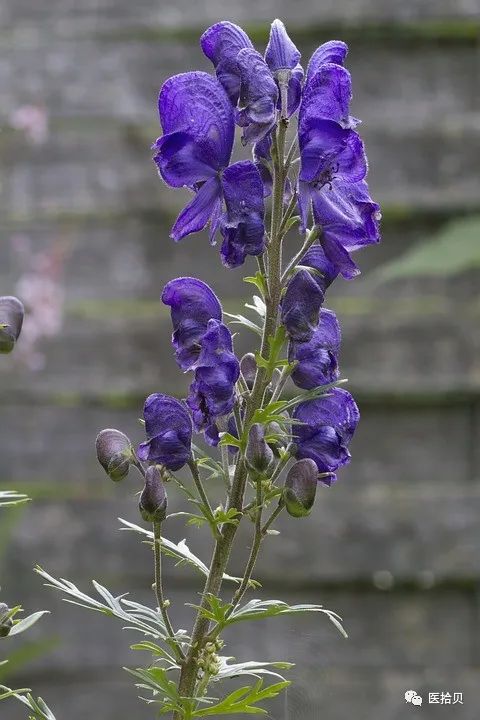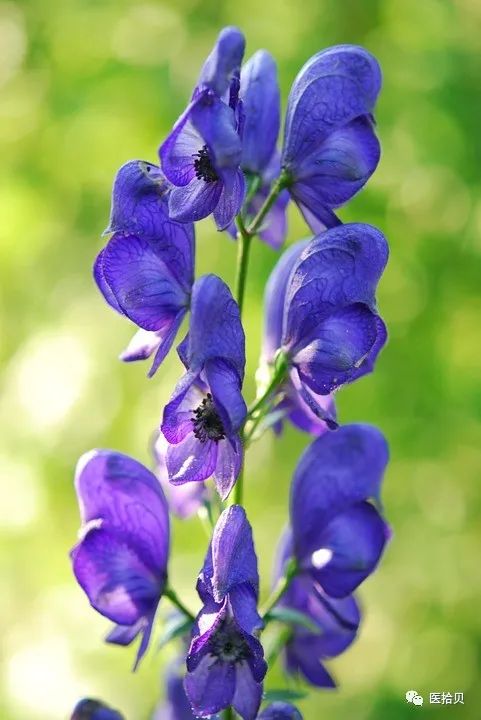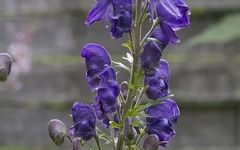Fuzi (Aconite)

Fuzi is a lateral tuber of the plant Aconitum, belonging to the Ranunculaceae family. Its main root is called Chuanwu (川乌). Fuzi contains various alkaloids, primarily aconitine, mesaconitine, and hypaconitine. Aconitine is highly toxic, and its nature is unstable and easily hydrolyzed. Through high-temperature processing (fumigation, boiling, baking, etc.), it can be hydrolyzed into the less toxic benzoylaconine, and further decomposed into the very low toxicity aconine (aconitine).【Properties and Channels】Pungent, hot; toxic. Enters the Heart, Kidney, and Spleen meridians.【Functions】Revives Yang, rescues from collapse, supplements fire to assist Yang, disperses cold, and alleviates pain.
 Folklore about FuziFuzi is a well-known medicinal material from Jiangyou, Sichuan, where its quality is highly regarded worldwide. In ancient times, the people of Shu were well aware of the unique properties of this herb, leading to many legends that enriched the cultural connotation of Fuzi and established its medicinal culture.Although Fuzi sounds like “father and son” (父子), it has little to do with familial relationships in the stories. Qianyuan Mountain in Jiangyou, Sichuan, is a sacred place where Daoist culture flourishes. Many Daoists believe it to be a blessed land, thus constructing numerous temples. During the cold winter, these temples also became shelters for the poor to escape the cold.In one temple, a kind old Daoist would often gather herbs from Qianyuan Mountain to treat illnesses and maintain health, and everyone was very grateful to him. One day, as he was about to prepare a meal in the woodshed, he discovered an unfamiliar herb. After pulling it out, he found it had many roots and a spindle-shaped tuber with numerous tangled fibrous roots. The old Daoist felt this plant was extraordinary and added it to his alchemical preparations. The resulting pills significantly enhanced the physical strength of those who consumed them, allowing many to withstand the cold in winter.The old Daoist continuously provided these miraculous pills to the people, day after day, year after year, until he grew old. He worried that after his death, no one would be able to prepare this medicine to help people ward off the cold, so he took in an orphan as a disciple and passed on his medical knowledge to the young Daoist. Together, they helped countless impoverished people.Since ancient medical knowledge was often passed down from father to son, people mistakenly believed that this young Daoist was the old Daoist’s son, misunderstanding their teacher-disciple relationship. Thus, the herb with the tuber attached to the main root came to be called “father-son medicine” (父子药), which over time evolved into “Fuzi” (附子).
Folklore about FuziFuzi is a well-known medicinal material from Jiangyou, Sichuan, where its quality is highly regarded worldwide. In ancient times, the people of Shu were well aware of the unique properties of this herb, leading to many legends that enriched the cultural connotation of Fuzi and established its medicinal culture.Although Fuzi sounds like “father and son” (父子), it has little to do with familial relationships in the stories. Qianyuan Mountain in Jiangyou, Sichuan, is a sacred place where Daoist culture flourishes. Many Daoists believe it to be a blessed land, thus constructing numerous temples. During the cold winter, these temples also became shelters for the poor to escape the cold.In one temple, a kind old Daoist would often gather herbs from Qianyuan Mountain to treat illnesses and maintain health, and everyone was very grateful to him. One day, as he was about to prepare a meal in the woodshed, he discovered an unfamiliar herb. After pulling it out, he found it had many roots and a spindle-shaped tuber with numerous tangled fibrous roots. The old Daoist felt this plant was extraordinary and added it to his alchemical preparations. The resulting pills significantly enhanced the physical strength of those who consumed them, allowing many to withstand the cold in winter.The old Daoist continuously provided these miraculous pills to the people, day after day, year after year, until he grew old. He worried that after his death, no one would be able to prepare this medicine to help people ward off the cold, so he took in an orphan as a disciple and passed on his medical knowledge to the young Daoist. Together, they helped countless impoverished people.Since ancient medical knowledge was often passed down from father to son, people mistakenly believed that this young Daoist was the old Daoist’s son, misunderstanding their teacher-disciple relationship. Thus, the herb with the tuber attached to the main root came to be called “father-son medicine” (父子药), which over time evolved into “Fuzi” (附子).
Clinical Applications
1. For Yang Deficiency Syndrome, characterized by cold sweat, cold limbs, and a faint pulse.Fuzi can assist the Heart Yang to open the meridians and supplement the Kidney Yang to nourish fire, rescuing the lost original Yang, making it a crucial medicine for reviving Yang and rescuing from collapse. It is often used with Ganjiang (干姜) and Gancao (甘草) to enhance the effect of reviving Yang, known as Si Ni Tang (四逆汤); if Yang is weak and Qi is lost, with profuse sweating and shortness of breath, it can be used with Ren Shen (人参) to restore Yang and stabilize collapse, known as Shen Fu Tang (参附汤).2. For Yang Deficiency Syndrome. This herb is good at supplementing fire and assisting Yang, suitable for any organ with weak Yang Qi, including the Kidney, Spleen, and Heart.If there is insufficient Kidney Yang, with cold limbs, lower back pain, weakness, impotence, and frequent urination, it can be used with Rougui (肉桂), Shudi (熟地), and Shanzhuyu (山茱萸), such as in Gui Fu Ba Wei Wan (桂附八味丸); if there is internal cold and Spleen Yang is weak, with abdominal pain and loose stools, it can be used with Ren Shen, Bai Zhu (白术), and Ganjiang, such as in Fuzi Lizhong Wan (附子理中丸); for Spleen and Kidney Yang deficiency with water retention, leading to difficulty urinating and edema, it can assist Yang in transforming Qi, often used with Bai Zhu and Fuling (茯苓), such as in Zhenwu Tang (真武汤); for weak Heart Yang, with palpitations, shortness of breath, and chest pain, it can be used with Ren Shen and Guizhi (桂枝). Additionally, for Wei Yang deficiency with spontaneous sweating, it can be used with Huangqi (黄芪) and Guizhi; for Yang deficiency with external wind-cold, it can be used with Mahuang (麻黄) and Xixin (细辛), etc. In summary, Fuzi can warm the Yang of the whole body, applicable for all Yang deficiency cases.3. For Bi Pain. It is suitable for conditions with predominant cold-dampness and severe joint pain, as it can dispel cold-dampness, warm the meridians, and alleviate pain.It can be used with Guizhi and Bai Zhu, such as in Gancao Fuzi Tang (甘草附子汤).【Dosage】3-15g. When used in decoctions, it should be boiled for 30-60 minutes first to reduce its toxicity.【Precautions】Not suitable for pregnant women.
Changsha Pharmacological Analysis
Fuzi is pungent, salty, and bitter, warm, and enters the Foot Taiyin Spleen and Foot Shaoyin Kidney meridians. It warms water and dries dampness, dispels cold, warms the Spleen, and enters the lower jiao to warm the Kidney, supplementing the fire of the vital essence and restoring the lost Yang. It treats coldness in the hands and feet, opens the stagnation of the internal organs, alleviates abdominal pain, relieves stiffness in the ankles and knees, unblocks cold and stasis in the meridians, and resolves cold accumulation in hernias. It can also descend turbid Yin and reverse upward Qi, alleviating nausea and vomiting, and is effective in relieving fullness and distension.The principles of Yin and Yang are interdependent; Yin descends and transforms into water, while Yang rises and transforms into fire. Water is rooted in fire, hence when Yang descends, it transforms into Yin, and when Yin rises, it transforms into Yang. If water and fire do not interact, heat arises above while cold remains below. Diseases in the upper and lower parts are fundamentally due to the failure of the central Qi. The Earth element represents the central Qi of water and fire; if the Earth does not descend, fire cannot interact with water, leading to upper heat; if the Earth does not rise, water cannot interact with fire, leading to lower cold. When the ascending and descending processes are reversed, fire weakens and water prevails, resulting in dampness. When fire is strong, the Earth becomes dry, leading to water depletion and the manifestation of excess heat, as seen in the symptoms of Yangming Chengqi syndrome. Chengqi syndrome is less common, while Zhenwu syndrome is more prevalent, as water is easier to accumulate while fire is easier to weaken. When fire weakens and the Earth is damp, the fire of Ding (丁) surges while the water of Gui (癸) overflows, resulting in cold accumulation in the middle and lower parts.Fire cannot overcome water, which is a natural principle. What is relied upon is the time of prosperity; the Earth generates to control it. As it gradually weakens, both the mother and child become weak, and when both fire and Earth are deficient, the Earth loses the power to control water, leading to the defeat of fire and the humiliation of Earth. When fire revives and Earth recovers, life is restored; when fire is extinguished and Earth collapses, death ensues. A person’s death occurs due to the mutual defeat of fire and Earth, allowing water to prevail. Therefore, formulas like Fuzi, Zhenwu, and Si Ni are all designed to supplement both fire and Earth to overcome cold water. The intentions of Zhang Zhongjing, the ancient master, are not understood by later generations of mediocre practitioners. Fuzi is heavy and descends, warming the Spleen Earth and entering the Shaoyin to warm the Kidney water. When the Kidney water is warm, the sovereign fire returns to its root, clearing the upper heat and nourishing the root of Yang, a function that cannot be easily replaced.The ministerial fire is the assistant of the sovereign fire; when the sovereign fire moves, the ministerial fire follows. The Foot Shaoyang transforms into ministerial fire, descending with the sovereign fire and interacting with Gui water. The warmth of Gui water is the secret of ministerial fire; if the sovereign fire does not store, the ministerial fire will also leak, and both sovereign and ministerial fires will surge, leading to upper heat. The severity of upper heat is entirely due to ministerial fire, which is violent and rapid, unlike the gentle nature of sovereign fire. When a person’s spirit is calm and their soul is at peace, it is due to the return of both fires. If the sovereign fire is excessive, the heart is unsettled, and the spirit is anxious; if the ministerial fire is excessive, the gallbladder is disturbed, and the soul is frightened. Therefore, symptoms of internal injury and deficiency must arise from the coldness of water and dampness of the Earth, preventing the return of both fires. Mediocre practitioners mistakenly believe it is due to blood deficiency and use moistening herbs, such as Gui Pi and Bu Xin formulas, which mislead many. Fuzi should be used to warm water, allowing both sovereign and ministerial fires to return to their roots, thus calming the spirit and soul. However, to regulate water and fire, one must first treat the Earth; it is not sufficient to simply supplement the Earth and nourish the center, dry dampness, and descend the counterflow; Fuzi cannot achieve miraculous effects alone. If there is a long-standing condition of anxiety and cold accumulation, with a hard and full lower abdomen, Fuzi should not be used. If the medicine does not overcome the disease, it can cause great harm. Instead, use Guizhi, Fuzi, Jiao, and Jiang, ground and applied to the lower abdomen to dispel cold and aid digestion. All internal injuries and various miscellaneous diseases stem from insufficient central Qi, with water being abundant and fire being rapid, leading to lower cold and upper heat; there are no cases of lower heat. If lower cold is predominant, Fuzi should warm Gui water and restrain Ding fire, which has remarkable effects. It is particularly suitable for the three Yin syndromes of cold damage. However, if there is lower heat, Fuzi is not appropriate, as it indicates cold water and damp Earth causing wood to be trapped. Insufficient vitality leads to depression and the generation of lower heat; although lower heat may arise, the root of the disease remains damp and cold. Conditions such as metrorrhagia, leucorrhea, dysuria, and black jaundice are all symptoms of wood stagnation and lower heat. However, if one treats with clear and moistening herbs, dampness will only increase, leading to more wood stagnation and heat. The method should involve ginger, licorice, poria, and white atractylodes, supplemented with herbs that clear wind and disperse wood; once the stagnation and heat are removed, Fuzi can warm the lower jiao, which is suitable in 90% of cases. However, the method varies in skill, and timing is important.
 Scan to follow us
Scan to follow us

